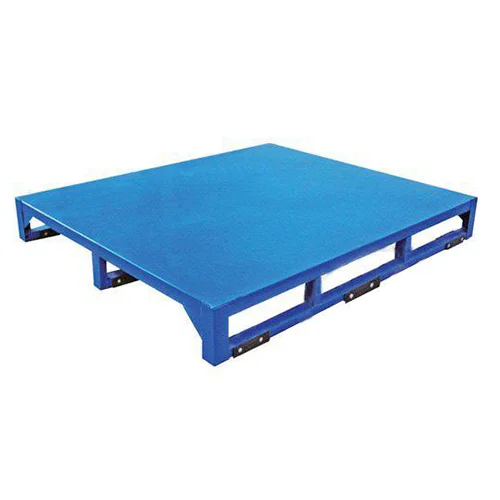The logistics industry is the backbone of modern commerce, facilitating the seamless movement of goods from production to consumption. Within this complex network, packaging and transportation materials play a crucial role in ensuring the safety, efficiency, and cost-effectiveness of the entire supply chain. Among these materials, steel pallets stand out for their durability, reliability, and versatility.

The Basics of Steel Pallets
Steel pallets are steel pallets used for transporting and storing goods. Unlike traditional wooden or plastic pallets, steel pallets are made from high-quality steel plates that are welded together to form a strong and durable base. This construction gives steel pallets excellent physical properties, making them an integral part of the logistics industry.
Key Characteristics
1. High Load-Bearing Capacity: Steel pallets can support heavy loads without risk of breaking or deformation. This makes them ideal for transporting bulky or dense goods.
2. Compressive Resistance: The robust construction of steel pallets ensures they can withstand significant pressure, maintaining their structural integrity even under challenging conditions.
3. Durability: Steel pallets are resistant to wear and tear, weather conditions, and pests, providing a long-lasting solution for logistics needs.
The Importance of Steel Pallets in Logistics
Enhanced Safety and Security
The durability of steel pallets significantly reduces the risk of product damage during transportation. Their high load-bearing capacity and compressive resistance mean that goods are less likely to be crushed or damaged, ensuring the integrity of the product from origin to destination. Additionally, steel pallets are less susceptible to environmental factors such as moisture and pests, further protecting the goods they carry.
Cost Efficiency
While the initial investment in steel pallets may be higher than for wooden or plastic alternatives, their longevity and reusability make them a more cost-effective option over the long term. Steel pallets can be used repeatedly without significant degradation, reducing the need for frequent replacements. This not only saves on procurement costs but also minimizes waste and environmental impact.
Environmental Benefits
The use of steel pallets contributes to more sustainable logistics practices. Unlike wooden pallets, which require regular replacement and disposal, steel pallets can be recycled and reused indefinitely. This reduces waste, conserves natural resources, and lowers the carbon footprint of the logistics industry.
Conclusion
Steel pallets play a vital role in the logistics industry, providing a durable, reliable, and cost-effective solution for transporting and storing goods. Nanjing Shengke, with its commitment to quality, innovation, and customer satisfaction, stands out as a leader in the steel pallet market. By offering customizable solutions, advanced manufacturing techniques, and comprehensive services, Nanjing Shengke is helping logistics companies optimize their operations, improve safety, and reduce environmental impact. As the logistics industry continues to evolve, steel pallets and Nanjing Shengke will remain key drivers of progress and efficiency.
https://www.thankrack.com/the-important-role-of-steel-pallets-in-the-logistics-industry.html
